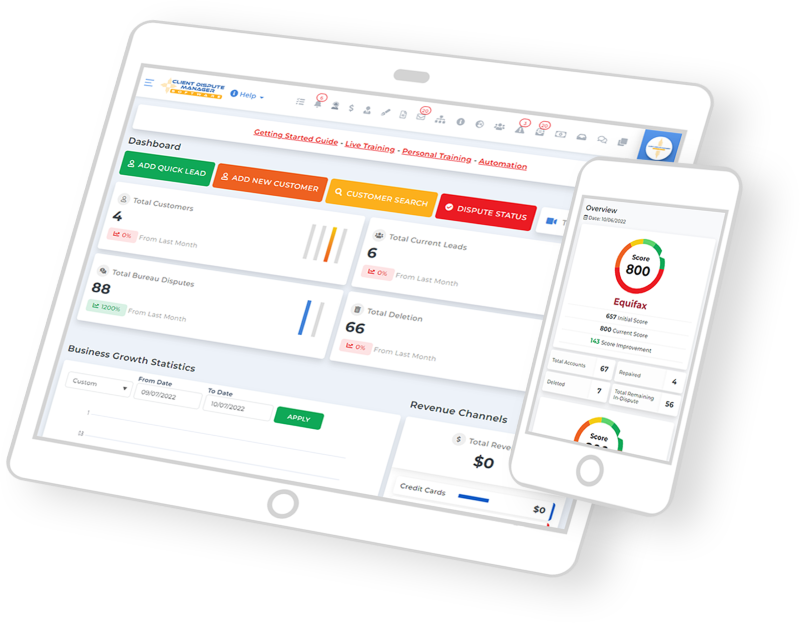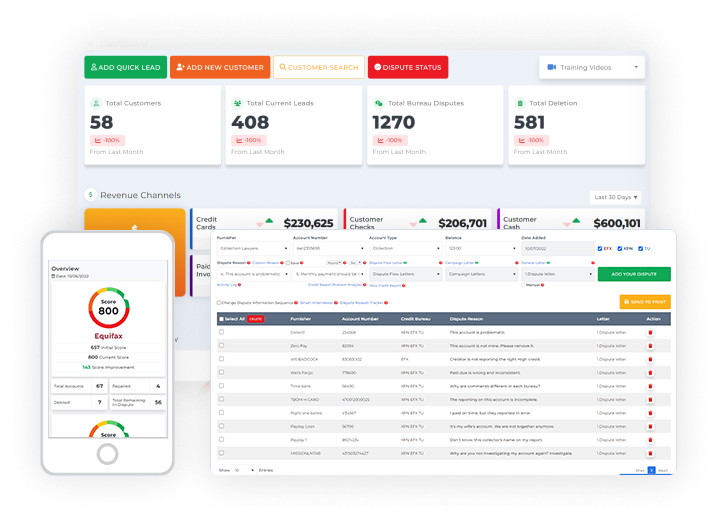Are you an individual looking to repair your credit or a credit repair company helping clients improve their financial standing? If so, it’s crucial to know about a powerful tool in your credit repair arsenal: the debt validation letter.
This letter is particularly unwelcome by debt collectors, as it requires them to provide proof of the debt they claim you owe. In this comprehensive guide, we’ll dive deep into the world of debt validation letters, exploring their legal basis, components, and how they can help you navigate the complex landscape of credit repair.
Start Today and Explore the Features Firsthand!
The Power of the Debt Validation Letter
A debt validation letter is a formal request sent to a debt collector, asking them to provide detailed information about the alleged debt they are attempting to collect. The purpose of this letter is to ensure that the debt is legitimate and that the collector has the legal right to pursue it.
The strategic timing for using a debt validation letter is upon receiving a dunning letter or noticing an unjust collection account on your credit report.
Real-World Scenarios
To illustrate the power of debt validation letters, let’s consider a few real-world scenarios:
- Identity Theft: If you discover a collection account on your credit report that you believe is the result of identity theft, a debt validation letter can be the first step in resolving the issue. By requesting validation of the debt, you can determine whether the debt is legitimate and take appropriate action to remove it from your credit report.
- Zombie Debt: Sometimes, debt collectors attempt to collect on debts that are past the statute of limitations or have already been paid. These debts are known as “zombie debts.” By sending a debt validation letter, you can force the collector to provide proof that the debt is still legally collectible and belongs to you.
- Inaccurate Information: If you notice inaccuracies in a collection account, such as an incorrect balance or a debt that doesn’t belong to you, a debt validation letter can help you gather the necessary information to dispute the error and have it corrected on your credit report.
Components of the Debt Validation Letter

When crafting your debt validation letter, it’s essential to include your full name and address for identity verification purposes. However, avoid including sensitive information like your social security number or date of birth, as this could potentially be misused. Make sure to clearly state the debt collector’s address and the date to ensure proper delivery and tracking.
Start Today and Explore the Features Firsthand!
The Core of the Letter: Requesting Debt Validation
The heart of your debt validation letter lies in the request for a detailed validation of the alleged debt. This is where you’ll want to reference the Fair Debt Collection Practices Act (FDCPA) as the legal basis for your request. Be cautious of any language that might imply acknowledgment of the debt, as this could weaken your position. Instead, focus on requesting specific information, such as:
- The original creditor’s name and address.
- The original account numbers.
- The amount owed and a breakdown of any fees or interest included in the total.
- The date of the last payment made on the account.
- Proof that the debt collector is licensed to collect debts in your state.
The Fair Debt Collection Practices Act (FDCPA)
The FDCPA is a federal law that regulates the actions of third-party debt collectors. Under the FDCPA, debt collectors are required to provide certain information when they first contact you about a debt, including:
- The name of the creditor.
- The amount of the debt.
- A statement that unless you dispute the validity of the debt within 30 days, the debt will be assumed to be valid.
- A statement that if you request validation of the debt within 30 days, the collector will provide verification of the debt.
By referencing the FDCPA in your debt validation letter, you are reminding the debt collector of their legal obligations and demonstrating your knowledge of your rights as a consumer.
Start Today and Explore the Features Firsthand!
Legal and Procedural Aspects

Under the FDCPA, debt collectors are legally required to provide validation of the debt upon request. This validation must include proof that the debt is yours and that the amount is correct. If a debt collector fails to provide adequate validation, they may be in violation of the FDCPA and subject to legal action.
It’s also important to note that each state has its own statutes and licensing requirements for debt collectors, so be sure to research your state’s specific laws.
Dealing with Uncooperative Debt Collectors
If a debt collector fails to respond to your validation request or provides insufficient information, you have several options:
- File a Complaint: You can file a complaint with the Consumer Financial Protection Bureau (CFPB) or your state’s Attorney General’s office. These agencies can investigate the debt collector’s practices and take action if necessary.
- Send a Cease and Desist Letter: If the debt collector continues to contact you without providing proper validation, you can send a cease and desist letter demanding that they stop all communication with you.
- Seek Legal Advice: If the debt collector’s actions are particularly egregious or you believe you have a strong case, you may want to consult with a consumer protection attorney who specializes in FDCPA violations.
Utilizing Technology for Credit Repair
Managing the debt validation process can be complex and time-consuming, especially if you’re dealing with multiple collection accounts. This is where technology can be a valuable asset. Client Dispute Manager Software designed to streamline and automate the debt validation process. With features like customizable templates, bulk letter sending, and response tracking, this tool can save you significant time and effort.
Client Dispute Manager: A Comprehensive Guide

Client Dispute Manager Software is an intuitive, web-based platform that simplifies the debt validation process. Here’s a step-by-step guide on how to use the software:
- Create an Account: Visit the Client Dispute Manager Software and sign up for an account. You can choose between a free trial and paid subscription plans.
- Add Clients: If you’re a credit repair company, you can add your clients to the platform, organizing their information and collection accounts in one central location.
- Generate Validation Letters: Using the software’s customizable templates, you can quickly generate debt validation letters for each collection account. Simply input the necessary information, such as the client’s name, address, and the debt collector’s details, and the software will create a professional, legally compliant letter.
- Send Letters: With Client Dispute Manager, you can send validation letters directly from the platform, either through email or certified mail. The software will keep a record of when each letter was sent and to whom.
- Track Responses: As debt collectors respond to your validation requests, you can track their responses within the Client Dispute Manager platform. The software will organize the responses, making it easy to see which debts have been validated and which ones require further action.
- Analyze and Report: Client Dispute Manager provides detailed analytics and reporting features, allowing you to track the progress of your credit repair efforts over time. You can generate reports for individual clients or your entire business, helping you identify areas for improvement and celebrate your successes.
By leveraging the power of technology and automating the debt validation process, you can save time, reduce errors, and ultimately achieve better results for yourself or your clients.
Start Today and Explore the Features Firsthand!
Frequently Asked Questions (FAQs)
What Is A Debt Validation Letter?
A debt validation letter is a formal request sent to a debt collector, asking them to provide detailed information about the alleged debt they are attempting to collect.
When Should I Send A Debt Validation Letter?
The strategic timing for using a debt validation letter is upon receiving a dunning letter or noticing an unjust collection account on your credit report.
What Information Should I Include in My Debt Validation Letter?
Include your full name and address for identity verification purposes, but avoid including sensitive information like your social security number or date of birth. Make sure to clearly state the debt collector’s address and the date.
What Should I Request In My Debt Validation Letter? ?
Request specific information about the alleged debt, such as the original creditor’s name and address, the original account number, the amount owed, the date of the last payment, and proof that the debt collector is licensed to collect debts in your state.
What Are The Legal Requirements For Debt Collectors When Responding To A Validation Letter?
Under the FDCPA, debt collectors are legally required to provide validation of the debt upon request, including proof that the debt is yours and that the amount is correct. Failure to provide adequate validation may subject them to legal action.
Conclusion
Debt validation letters are a critical tool in disputing questionable debts and repairing your credit. By understanding the components of a strong validation letter, leveraging technology to streamline the process, and knowing your rights under the FDCPA, you can take proactive steps towards financial health. Remember, credit repair is a journey, but with the right tools and knowledge, you can achieve your goals and secure a brighter financial future.

Mark Clayborne
Mark Clayborne specializes in credit repair, starting and running credit repair businesses. He's passionate about helping businesses gain freedom from their 9-5 and live the life they really want. You can follow him on YouTube.
Start Today and Explore the Features Firsthand!
Below Is More Content For Your Review:
- Prepare Your Dispute Letters for the Collectors in 15 Seconds
- How to Get 850 Credit Score: A Step-by-Step Guide



